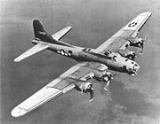Rivet1
I've considered the reasons for the dearth of German heavy long-range aerial bombardment capability development in the years preceeding the Second World War and have discovered a few influencing events that would have given the Luftwaffe leadership to act on the supposition that they could have prosecuted, successfully, the war that they planned out.
Hermann Goering, the Reichmarshal in charge of overall Luftwaffe leadership, received recommendations from several of his general staff officers to cease heavy bomber development in favor of the smaller, less material-hungry medium bombers. One event of note, occuring three days prior to the Thursday April 29, 1937 order to Dorniers and Junkers to cease four-engine development, was the bombing of Guernica, Spain by German built and manned aircraft in support of Franco's Nationalist forces. This air bombardment caused the Republican forces to withdraw to the last line of defences. The success was not lost on the General Staff planning future operations.
Goering, as well as Luftwaffe chief, was also charged with the implimentation of a four year economic plan that was to, as much as possible, make Germany independent of external materials. The obvious lesser material requirements of the medium bomber were decisive to the order to cease multi-engine development. Infighting began between the military services for material allocations early in 1937, culminating in a November meeting presided over by Hitler.
The long range heavy bomber still had its paladins in the Luftwaffe after the death of the General Walther Wever in an air crash in June of 1936. Wever was the author of German airpower development doctrine which included the ability to strike far and hard. Both the Inspector of Bombers, Paul Pflugbeil and the General Staff Chief of Operations, Major Paul Deichmann, sought personal interviews with Goering at his Karinhall country estate to plead for the continuance of the planned development in the spring of 1937. The valid arguments the officers presented were decried by both Goering and Erhard Milch, the Air Ministry chief. "The policy has been decided in the favor of the Ju 88. Any question of developing and constructing a four-engined bomber does not arise.", stated Milch.
An order by Hitler to resume four-engine development came in November of 1943, when Zhukov's appearance on the outskirts of Berlin was just a matter of time.
Hermann Goering, the Reichmarshal in charge of overall Luftwaffe leadership, received recommendations from several of his general staff officers to cease heavy bomber development in favor of the smaller, less material-hungry medium bombers. One event of note, occuring three days prior to the Thursday April 29, 1937 order to Dorniers and Junkers to cease four-engine development, was the bombing of Guernica, Spain by German built and manned aircraft in support of Franco's Nationalist forces. This air bombardment caused the Republican forces to withdraw to the last line of defences. The success was not lost on the General Staff planning future operations.
Goering, as well as Luftwaffe chief, was also charged with the implimentation of a four year economic plan that was to, as much as possible, make Germany independent of external materials. The obvious lesser material requirements of the medium bomber were decisive to the order to cease multi-engine development. Infighting began between the military services for material allocations early in 1937, culminating in a November meeting presided over by Hitler.
The long range heavy bomber still had its paladins in the Luftwaffe after the death of the General Walther Wever in an air crash in June of 1936. Wever was the author of German airpower development doctrine which included the ability to strike far and hard. Both the Inspector of Bombers, Paul Pflugbeil and the General Staff Chief of Operations, Major Paul Deichmann, sought personal interviews with Goering at his Karinhall country estate to plead for the continuance of the planned development in the spring of 1937. The valid arguments the officers presented were decried by both Goering and Erhard Milch, the Air Ministry chief. "The policy has been decided in the favor of the Ju 88. Any question of developing and constructing a four-engined bomber does not arise.", stated Milch.
An order by Hitler to resume four-engine development came in November of 1943, when Zhukov's appearance on the outskirts of Berlin was just a matter of time.


